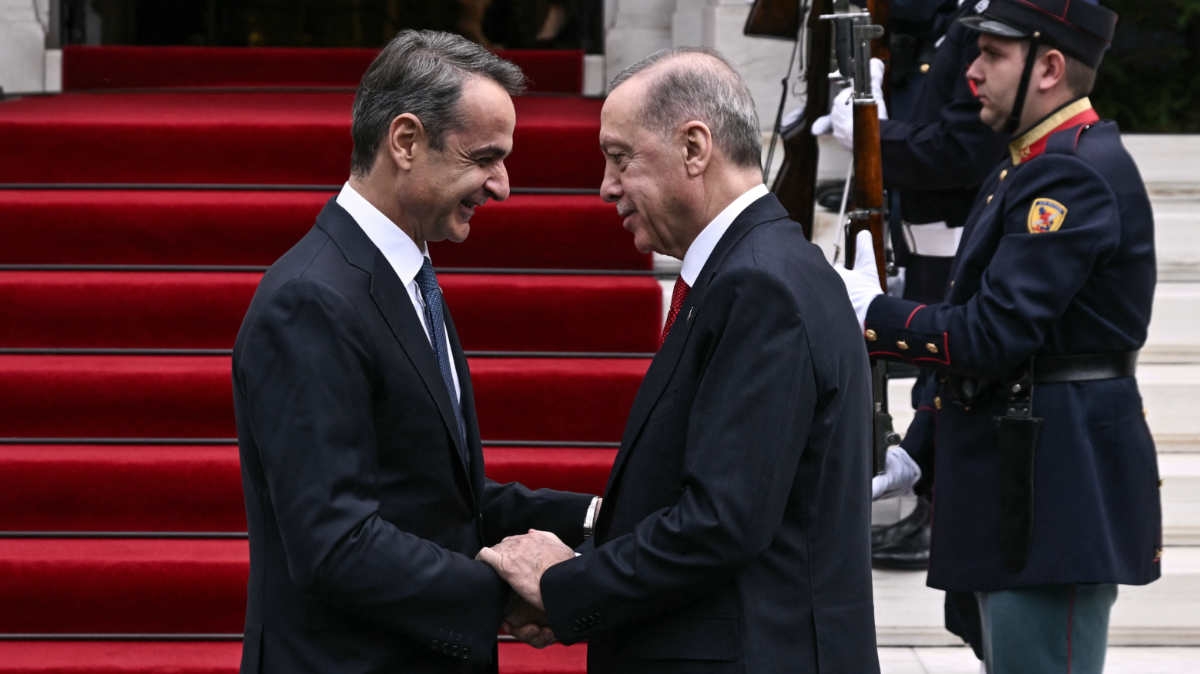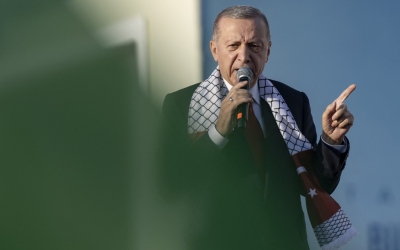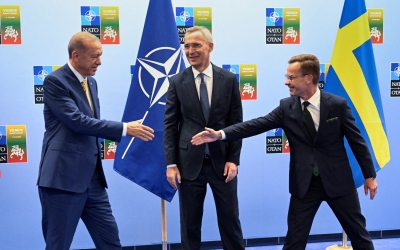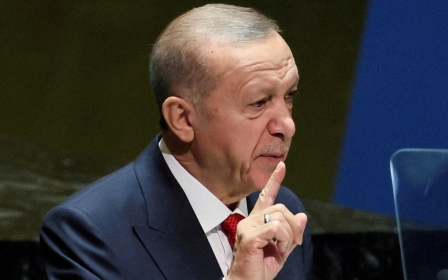Turkey: Erdogan eyes reset with Greece amid war in Gaza and talks with US over F-16s

Turkish President Recep Tayyip Erdogan is looking to restart relations with Greece after years of tension, as Ankara contends with the fallout from the war in Gaza and continues to push the US to take steps on the sale of F-16 fighter jets.
"There is no problem that cannot be solved between us," Erdogan told reporters as he met Greek Prime Minister Kyriakos Mitsotakis in Athens on Thursday, adding that he wanted to turn "the Aegean into a sea of peace and cooperation".
Erdogan had set the tone for the trip in an interview with Greece's Kathimerini newspaper on Wednesday, in which he addressed the Greek leader as "My friend Kyriakos".
Mitsotakis acknowledged in a joint statement that relations had been "dangerously threatened" in the past, but were now on a "calmer path".
"I feel a historic debt to utilise the opportunity to bring the two nations side by side, as are our borders," Mitsotakis said.
Stay informed with MEE's newsletters
Sign up to get the latest alerts, insights and analysis, starting with Turkey Unpacked
For now, the two have cast aside the thorniest issues between them to focus on "low-level diplomacy" and confidence-building measures where they can achieve immediate, tangible results and promote a positive agenda.
During the almost five-hour meeting in Athens, Turkish and Greek officials signed a raft of agreements on the economy, tourism, agriculture and migration. Erdogan also said he hoped they could double bilateral trade to $10bn, from the current $5.5bn.
In one of the most anticipated deals, Greece said it would revive an expedited seven-day tourist visa programme enabling Turks to visit 10 Greek islands close to the Turkish coast.
'Moratorium on tensions'
Ahead of the visit, Greek officials also publicly credited Ankara with helping stem migration, noting a 60 percent drop in migrants arriving illegally on Greece's islands because of better cooperation with Turkey's coastguard.
Constantinos Filis, director of the Institute of Global Affairs and a professor of international relations at the American College of Greece, told Middle East Eye that the thaw between Greece and Turkey had not reached the level of a "rapprochement", but the "moratorium on tensions" could gain momentum after the visit.
'Turkey realises that good relations with Washington run through Athens'
– Senior western official
"Erdogan has decided, for the time being, that this suspension of tensions serves Turkey's interests," Filis said.
"There is a will on both sides to consolidate the benefits of de-escalation and continue to focus on the positive agenda," he added.
Tensions flared in 2020 during a dispute over maritime claims, and continued to soar until early this year, with Erdogan threatening to invade the Greek islands.
They cooled, however, after Greece dispatched aid to Turkey following a deadly earthquake in February.
Both Mitsotakis and Erdogan also secured resounding victories in their respective general elections this year, creating what analysts say is a unique, years-long window before another major vote, in which sensitive issues like the maritime dispute can be discussed.
Gaza consolidates new Mediterranean alliances
The thaw in ties between Greece and Turkey is a rare bright spot for Europe and the Mediterranean, which is convulsed by war in Ukraine and Israel's ongoing assault on Gaza.
Murat Aslan, a former high-ranking Turkish military officer, now a researcher with Turkey's Seta foundation, said the longlist of foreign policy challenges facing Turkey contributed to Ankara's pivot.
"Turkey has so many foreign policy problems running right now, it does not want to see tensions with Greece as a priority. The war in Syria, tensions in the Caucasus, Ukraine and Palestine are now a lot more important."
'What would happen if [Turkey's] parliament said yes to Sweden's Nato accession but the US didn't sell Turkey F-16s?'
- Murat Aslan, Seta Foundation
Aslan said Turkey had also "learned lessons" from the 2019-2020 period of heightened tensions in the eastern Mediterranean, when Greece leaned on Israel, Egypt, France and Gulf states to bolster its security.
"Turkey does not want to be isolated in the eastern Mediterranean by these coalitions," he added.
Erdogan's first visit to Greece since 2017 has been overshadowed by the war raging in Gaza.
Greece's deputy foreign minister, Alexandra Papadopoulou, caused a stir in Athens last month when she suggested that Israel's offensive in Gaza would have a "positive" impact on Greek-Turkish ties, because neither could afford to live in "an exploding region".
The war has underlined a geopolitical shift in the eastern Mediterranean in recent years, which saw Greece and Israel forge a close alliance, while ties between Turkey and Israel withered.
Since the outbreak of war on 7 October, Greece has staunchly supported Israel. That backing contrasts sharply with Erdogan, who has slammed Israel's Prime Minister Benjamin Netanyahu as a "war criminal".
Besides their rhetoric, however, Aslan, at the Seta foundation, said Ankara and Athens had only "indirect interests" at stake in Gaza that pitted them against each other.
That contrasts sharply with Libya, where the two neighbours have backed opposing sides in a bid to advance competing maritime claims.
Nicholas Danforth, at the Hellenic Foundation for European and Foreign Policy (Eliamep), told MEE that so far the alignment of Middle Eastern states criticising Israel may have also helped limit Turkey's concerns about being isolated in the eastern Mediterranean.
"Turkey's genuine fear has always been that Greece, Cyprus and Israel will team up with the Abraham Accords states against them," Danforth told MEE.
"The backlash against Israel by Arab states over the war has slowed that process sufficiently that Erdogan has room to manoeuvre with Greece."
Last week, the US Treasury under-secretary for terrorism and financial intelligence, Brian Nelson, said he was "profoundly concerned" that Turkey was facilitating Hamas's access to international finance.
F-16 reciprocity
Erdogan's language on Hamas adds to other files driving a wedge between Ankara and the West, such as Turkey's growing economic links to Russia amid the war in Ukraine. But there are also areas where Turkey wants to engage, experts say.
Turkey wants an updated customs union with the EU. Meanwhile, Erdogan pivoted his economic policy after the elections, in a bid to draw international investors back to Turkey and rein in inflation that is still hovering at 60 percent.
Ahead of Erdogan's visit to Athens, a senior western diplomat told MEE there was a sense that reviving ties with Greece was an easy issue for Erdogan to pursue to bolster relations with the West.
"Turkey realises that good relations with Washington run through Athens," the official said.
The biggest test of Turkey's ability to maintain working ties with Washington and Brussels while striking an independent foreign policy is agreeing to Sweden's accession to Nato.
Erdogan agreed to support Sweden's Nato accession in a deal struck on the sidelines of the Nato summit in Lithuania over the summer, where Sweden agreed to crack down on Kurdish militants and support Turkey’s accession to the EU.
US President Joe Biden also signalled that he would back Turkey's request to purchase F-16 fighter jets.
In October, Erdogan referred the ratification to Turkey's parliament, which his party and its coalition partners control. Sweden’s foreign minister said last week that he was told by Turkey the accession would be settled “within weeks”, but the move is still pending approval in parliament.
On Wednesday, Erdogan said that he wanted to see a "simultaneous" move by the US to push through the F-16 deal.
'Turkey's genuine fear has always been that Greece, Cyprus and Israel will team up with the Abraham Accords states against them'
- Nicholas Danforth, Eliamep
Aslan said that Erdogan's comments on Wednesday reflect a "deep mistrust" of Washington in Ankara, because Erdogan had referred the ratification to parliament but didn't see any public steps from the Biden administration to move forward the F-16 deal.
"From Turkey's perspective it's a basic rule of reciprocity. One step forward by me, and one step forward by you," he said.
"What would happen if parliament said yes to the accession of Sweden but the US didn’t sell Turkey F-16s? How would Erdogan explain that to people?"
Danforth, an expert on US-Turkish relations, said that the deal's "challenge has always been one of timing", adding that Erdogan's comments on Hamas and concerns about the group’s use of Turkey to tap financing added a new complication to the sale.
"People in Washington still want to make the F-16 deal work. I think ultimately they can get the F-16 deal done," he said.
Aegean overflights cease
US and European officials have told MEE that the Biden administration has a framework worked out for the deal, which would see the sale of advanced F-35 fighter jets to Greece and a separate sale of F-16s to Turkey.
The White House is required to notify Congress of any foreign arms sale, which has not occurred yet. The arms sale can be blocked by any four members of Congress - the chair and ranking members of the House and Senate foreign relations committees.
Democratic Senator Ben Cardin, who took over as chair of the powerful Senate Foreign Relations Committee from noted Turkey-hawk Robert Menendez, said in October that Sweden's Nato bid was just one of several issues he would look at, along with how Turkey "uses the F-16s".
Meanwhile, Congressman Gregory Meeks, the ranking member of the House Foreign Relations Committee, has said he would like to see a “de-escalation of tensions in the Aegean” in addition to Sweden’s accession.
The House and Senate Republican leaders on the committees have generally been more supportive of the sale.
If the Biden administration does move forward with the sale, Greece’s response could be a marker for the sustainability of the recent thaw.
Mitsotakis' speech to Congress in May 2022, urging US lawmakers to block arms sales to Turkey, riled Erdogan, who subsequently cut off all bilateral talks with Greece.
Filis told MEE, "The Greek government knows it doesn't have such a critical say in defining arms sales to Turkey. What we want is for Turkey to not make violations of Greek airspace."
Turkey's violations of Greek airspace in the Aegean have been one of the main issues, outside of Sweden’s Nato accession, that US lawmakers have zoned in on. Since the thaw in Greek-Turkish ties, those overflights have stopped.
Middle East Eye delivers independent and unrivalled coverage and analysis of the Middle East, North Africa and beyond. To learn more about republishing this content and the associated fees, please fill out this form. More about MEE can be found here.







